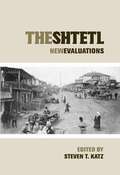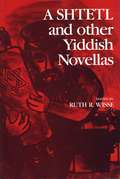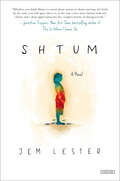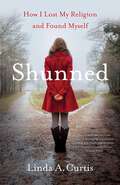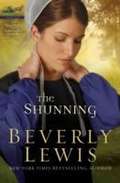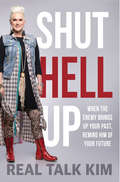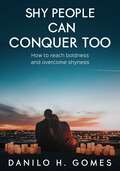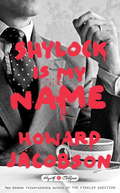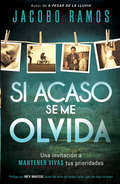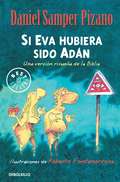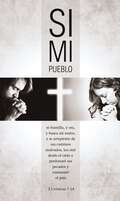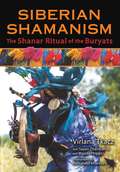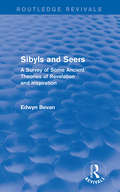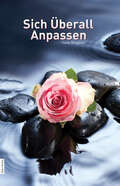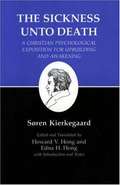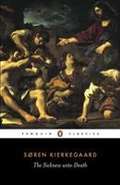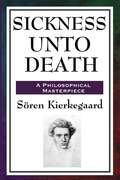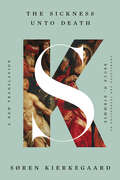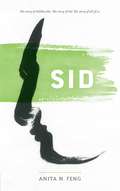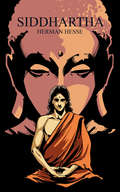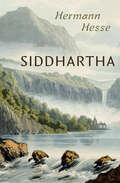- Table View
- List View
The Shtetl: New Evaluations (Elie Wiesel Center for Judaic Studies #1)
by Steven T Katz&“Anyone looking to really understand the Jewish past, not just the romanticized version of it, will find this book a perfect antidote.&” ―The Reporter Dating from the sixteenth century, there were hundreds of shtetls—Jewish settlements—in Eastern Europe that were home to a large and compact population that differed from their gentile, mostly peasant neighbors in religion, occupation, language, and culture. The shtetls were different in important respects from previous types of Jewish settlements in the Diaspora in that Jews had rarely formed a majority in the towns in which they lived. This was not true of the shtetl, where Jews sometimes comprised 80% or more of the population. While the shtetl began to decline during the course of the nineteenth century, it was the Holocaust that finally destroyed it. In recent decades the shtetl has attracted a growing amount of scholarly attention, though gross generalizations and romanticized nostalgia continue to affect how the topic is treated. This volume takes a new look at this most important facet of East European Jewish life. It helps to correct the notion that the shtetl was an entirely Jewish world and shows the ways in which the Jews of the shtetl interacted both with their co-religionists and with their gentile neighbors. The volume includes chapters on the history of the shtetl, its myths and realities, politics, gender dynamics, how the shtetl has been (mis)represented in literature, and the changes brought about by World War I and the Holocaust, among other historical events. Contributors include: Samuel Kassow, Gershon David Hundert, Immanuel Etkes, Nehemia Polen, Henry Abramson, Konrad Zielinski, Jeremy Dauber, Israel Bartel, Naomi Seidman, Mikhail Krutikov, Arnold J. Band, Katarzyna Wieclawska, Yehuda Bauer, and Elie Wiesel. &“A complex and rich subject.&”—AJS Review This is the first book published in the Elie Wiesel Center for Judaic Studies Series.
A Shtetl and Other Yiddish Novellas
by Ruth WisseThe five short novellas which comprise this anthology were written between 1890 and World War I. All share a common setting--the Eastern European Jewish town or shtetl, and all deal in different ways with a single topic--the Jewish confrontation with modernity. The authors of these novellas are among the greatest masters of Yiddish prose. In their work, today's reader will discover a literary tradition of considerable scope, energy, and variety and will come face to face with an exceptionally memorable cast of characters and with a human community now irrevocably lost. In her general introduction, Professor Wisse traces the development of modern Yiddish literature in the late 19th and early 20th centuries and describes the many shifts that took place between the Yiddish writers and the world about which they wrote. She also furnishes a brief introduction for each novella, giving the historical and biographical background and offering a critical interpretation of the work.
Shtum: A Novel
by Jem LesterA man shares a house with his autistic son and cranky elderly father in this &“moving, darkly funny novel&” (The Washington Post). Ben Jewell has hit a breaking point. His profoundly autistic ten-year-old son, Jonah, has never spoken, and Ben and his wife Emma are struggling to cope. When Ben and Emma fake a separation—a strategic yet ill-advised decision to further Jonah&’s case in an upcoming tribunal to determine the future of his education—father and son are forced to move in with Georg, Ben&’s elderly and cantankerous father. In a small house in north London, three generations of men—one who can&’t talk; two who won&’t—are thrown together. As Ben confronts single fatherhood, he must battle a string of well-meaning social workers and his own demons to advocate for his son, learning some harsh lessons about accountability from his father along the way. As the tribunal draws near, Jonah, blissful in his innocence, becomes the prism through which all the complicated strands of personal identity, family history, and misunderstanding are untangled, in this &“funny yet heartbreaking&” prize-winning debut (The Independent). &“Whether you think Shtum is a novel about autism or about marriage (it&’s both, by the way), you will agree that it is, in the end, a love story infused with wit, charm, and a deep appreciation for the complex beauty of damaged souls.&” —Jonathan Tropper, New York Times-bestselling author of This is Where I Leave You &“This is the literary territory of Tony Parsons and Nick Hornby, infused with the Jewish humor of Howard Jacobson and Shalom Auslander . . . an exhilarating roller coaster ride between pathos, comedy and anger.&” —The Guardian &“A remarkable book, at once hilarious, horrifying, and heartbreaking, written with the glum humor only Brits can carry off.&” —The Toronto Star
Shunned: How I Lost my Religion and Found Myself
by Linda A. CurtisA Jehovah&’s Witness&’ Painful but Liberating Realization that She Must Give Up Her Faith&“An inherently compelling and candidly revealing memoir . . . an extraordinary, riveting and unreservedly recommended read from first page to last.&”—Midwest Book ReviewLinda Curtis was raised as a Jehovah&’s Witness and is an unquestioning true believer who has knocked on doors from the time she was nine years old. Like other Witnesses, she has been discouraged from pursuing a career, higher education, or even voting, and her friendships are limited to the Witness community.Then one day, at age thirty-three, she knocks on a door—and a coworker she deeply respects answers the door. To their mutual consternation she launches into her usual spiel, but this time, for the first time ever, the message sounds hollow. In the months that follow, Curtis tries hard to overcome the doubts that spring from that doorstep encounter, knowing they could upend her &“safe&” existence. But ultimately, unable to reconcile her incredulity, she leaves her religion and divorces her Witness husband—a choice for which she is shunned by the entire community, including all members of her immediate family.Shunned follows Linda as she steps into a world she was taught to fear and discovers what is possible when we stay true to our hearts, even when it means disappointing those we love.&“. . . a moving portrait of one woman's life as a Jehovah's Witness and her painful but liberating realization that she must give up her faith.&”―Publishers Weekly&“Curtis&’s story reads as true to life . . . it will resonate across faith lines.&”—Foreword Reviews&“A profound, at times fascinating, personal transformation told with meticulous detail.&”—Kirkus Reviews&“...a riveting story, a page-turner, a magnificent contribution, and a book you will never forget.&”—Lynne Twist, global activist and author of The Soul of Money&“A wonderful book that is about so much more than the Jehovah&’s Witnesses.&”—Adair Lara, longtime columnist for the San Francisco Chronicle&“...brilliant, respectful, insightful and most of all hopeful.&”―Openly BookishReaders of Educated and Leaving the Witness will resonate with Linda Curtis&’ moving and courageous account of personal transformation.Order your copy today and begin reading this disturbing, heartbreaking, and ultimately inspiring memoir.
The Shunning: Heritage of Lancaster County #1
by Beverly Lewis[Back Cover]: "All her life [Katie] has longed for the forbidden things, but will her dreams come at a price too dear to pay? Why would Katie Lapp's mother, a plain and simple Amishwoman who embraces the Old Ways, hide a beautiful satin baby dress in the attic? The staggering answer comes on the eve of Katie's wedding to widower Bishop John, throwing her life--present and future--into confusion." The author, Beverly Lewis, drawing on the Amish heritage of her mother, understands the characters as if their author were one of them.
Shut Hell Up: When the Enemy Brings Up Your Past, Remind Him of Your Future
by Real Talk (Kimberly Jones-Pothier)FROM BEST SELLING AUTHOR KIMBERLY JONES-POTHIER AKA REAL TALK KIM If you want breakthrough, you have to break through! Most people struggle to assume the best of themselves. And their poor self-concept is only made worse by their past mistakes, poor choices, and failures. Kimberly has heard the inner voice that continually says, &“You can&’t.&” And she&’s learned how to shut it up. Known for telling it like it is, Real Talk Kim, as Jones-Pothier is known, challenges readers to stare inadequacy in the face and say, &“Not today!&” Exposing her own messes and failures, she leads readers on a journey to overcome the negative thinking, fear, loneliness, disappointment, and wrong view of self that have led to their feelings of inadequacy so they can walk in the fullness of God&’s purpose for them. The enemy is always going to tell people what they can and cannot do. He&’s always going to play into their fears and regrets. Jones-Pothier reveals the truths that will silence the accuser and empower readers to stop being ruled by their emotions, make choices from a place of confidence instead of doubt and insecurity, realize that God&’s plan is bigger than their past, reject the labels others have placed on them, let God determine who they are, and stop being a victim and find the freedom to be themselves. Breakthroughs don&’t come without a fight. Anyone who wants a breakthrough has to break through—they have to act. Providing practical tools that lead to victory, Shut Hell Up shows readers how to stop seeing themselves as inadequate and embrace who God says they are. When you feel not enough, God says I AM ENOUGH.This book will help you use what God says about you to fight negative self-talk and lies from the enemy. Other Books by Kimberly Jones-Pothier:When Your Bad Meets His Good (2018) ISBN: 978-1629995458
Shy People Can Conquer Too: How to reach boldness and overcome shyness
by Danilo H. GomesWe all know at least one shy person, right? In fact ... maybe you're the shy person. Anyway, the fact is that most people do not know how much suffering it is to live chained by the shackles of excessive shame. The only way out: work on your thoughts, one by one. Get to know this work and be enchanted by the number of existing arguments that can help you, a lot, in the fight against shyness. (This book is mainly intended for men).
Shylock Is My Name
by Howard JacobsonThe second book in the Hogarth Shakespeare series heralds the full-on 2016 anniversary celebration of Shakespeare: Man Booker Prize winner and our great chronicler of Jewish life retells the powerful, controversial story of Shylock.In The Merchant of Venice, the merchant Antonio borrows from the Jewish moneylender Shylock, whom he openly despises, to help fund his friend Bassanio's wooing of the beautiful, prized Portia. Shylock agrees--but on the condition that Antonio promise in return a pound of flesh should he be unable to repay the debt. When Antonio's ships are lost at sea and it becomes clear he cannot, the case goes to court: Antonio must honour his promise--until an unknown lawyer (Portia herself, dressed as a man) arrives and brilliantly picks the case apart. Jacobson takes the great tale of vengeance and cruelty and propels it through space and time to the shiny modern world of Cheshire's Golden Triangle, where we meet a funny, love-driven, vindictive cast of characters very much from our world, confronting Shakespeare's timelessly urgent questions in the 21st century.From the Hardcover edition.
Shylock Is My Name: William Shakespeare's The Merchant of Venice Retold: A Novel (Hogarth Shakespeare #2)
by Howard JacobsonMan Booker Prize-winner Howard Jacobson brings his singular brilliance to this modern re-imagining of one of Shakespeare's most unforgettable characters: Shylock Winter, a cemetery, Shylock. In this provocative and profound interpretation of "The Merchant of Venice," Shylock is juxtaposed against his present-day counterpart in the character of art dealer and conflicted father Simon Strulovitch. With characteristic irony, Jacobson presents Shylock as a man of incisive wit and passion, concerned still with questions of identity, parenthood, anti-Semitism and revenge. While Strulovich struggles to reconcile himself to his daughter Beatrice's "betrayal" of her family and heritage - as she is carried away by the excitement of Manchester high society, and into the arms of a footballer notorious for giving a Nazi salute on the field - Shylock alternates grief for his beloved wife with rage against his own daughter's rejection of her Jewish upbringing. Culminating in a shocking twist on Shylock's demand for the infamous pound of flesh, Jacobson's insightful retelling examines contemporary, acutely relevant questions of Jewish identity while maintaining a poignant sympathy for its characters and a genuine spiritual kinship with its antecedent--a drama which Jacobson himself considers to be "the most troubling of Shakespeare's plays for anyone, but, for an English novelist who happens to be Jewish, also the most challenging."
Si acaso se me olvida: Cómo encontrar el camino hacia una vida extraordinaria
by Jacobo RamosLa familia, el trabajo, los hijos, las metas. Todas ellas conforman prioridades de nuestra vida pero no están alineadas en el mismo orden. ¿Qué sucede cuando olvidamos qué es lo más importante? Esta lectura le ayudará a encontrar el balance en los puntos más importantes de su vida.El autor nos recuerda la necesidad de hacer esfuerzos intencionados para recorder qué fue lo que nos enamoró y nos apasionó en un principio. Nos invita a encontrar una vida de trascendencia a pesar de las descepciones, errores y limitaciones, recordándonos que los mejores tiempos no quedaron atrás.
Si Dios no escuchase: Cartas a Malcolm acerca de la oración
by C. S. LewisCompuestas como una colección de envíos ficticios a su amigo Malcolm, Si Dios no escuchase: Cartas a Malcolm acerca de la oración considera esta muestra básica de devoción en su forma, contenido y regularidad, y las maneras en que refleja nuestra fe y moldea nuestra forma de creer.En esta edición de la ficticia colección de cartas de C. S. Lewis, el venerado autor reflexiona sobre la naturaleza de la oración: qué es, cómo funciona y cómo debe practicarse. La oración es un don puro, un gran regalo de Dios. Así lo entiende también Lewis. Con su brillantez habitual, el autor utiliza su correspondencia con otro intelectual para arrojar luz sobre cuestiones como:¿Cuál es el valor de la oración?¿Es la oración un soliloquio que nadie escucha?¿Qué ocurre realmente cuando oramos?¿Tiene sentido orar por los difuntos?¿Por qué es importante la liturgia?En sus argumentos, Lewis muestra una fuerte convicción y, al mismo tiempo, una gran sensibilidad y comprensión hacia las debilidades y temores del hombre. Aunque Lewis nunca pretendió que este fuera un libro de instrucciones sobre cómo orar, descubrió que el formato de correspondencia le permitía compartir sus reflexiones de forma dinámica y personal.Si Dios no escuchase: Cartas a Malcom acerca de la oración fue el último libro que terminó C. S. Lewis. Publicado póstumamente en enero de 1964, tres meses después de su muerte, es uno de los mejores libros de Lewis, aunque quizá no uno de los más conocidos. Letters To Malcom: Chiefly on PrayerComposed as a collection of fictitious dispatches to his friend, Malcolm, Letters to Malcolm: Chiefly on Prayer considers this basic display of devotion in its form, content, and regularity, and the ways it both reflects our faith and shapes how we believe.In this edition of C. S. Lewis&’s fictitious collection of letters, the revered author ruminates on the nature of prayer—what it is, how it works, and how it should be practiced. Prayer is a pure gift, a great gift from God. This is also how Lewis understands it. With his usual brilliance, the author uses his correspondence with another intellectual to shed light on questions such as:What is the value of prayer?Is prayer a soliloquy that no one listens to?What is happening when we pray?Does it make sense to pray for the deceased?Why is liturgy important?In his arguments, Lewis shows a strong conviction and, at the same time, a great sensitivity and understanding for the weaknesses and fears of man.While Lewis never intended this to be a book of instruction on how to pray, he found that the correspondence format enabled him to share his reflections in a dynamic and personal way.Letters to Malcolm: Chiefly on Prayer was the last book C. S. Lewis finished. Published posthumously in January 1964, three months after his death, it is one of Lewis&’s best books though perhaps not one of his best known.
Si Eva hubiera sido Adán
by Daniel Samper PizanoLa biblia y sus historias vistas desde el punto de vista irreverente y lleno de humor de Daniel Samper Pizano. <P><P>De la mano de Daniel, el único personaje bíblico capaz de reír a carcajadas, este libro, como todo libro verdaderamente serio, dice muchas cosas insensatas desde el punto de vista epistemológico, metodológico, historiográfico y gramatical. <P>Por ejemplo: que si Eva hubiera sido Adán y Adán hubiera sido Dios, otro gallo cantaría en el gallinero del Antiguo Testamento; que por culpa de las borracheras de Noé la naturaleza perdió animales tan valiosos como el loropel, el cacadrilo, la gagalina y la culembra; que armado de un cuchillo de piedra, ¡Dios inventó la circuncisión!; que el primer gran centro delantero de la historia fue José, que Salomón sostenía 700 esposas y 300 concubinas, a pesar de lo cual lo llamaban "El Sabio".
Si mi pueblo: Una guía de 40 días de oración por nuestra nación
by Jack CountrymanSi mi pueblo guía a los creyentes por un viaje de oración de 40 días en el espíritu de 2 Crónicas 7.14."Si mi pueblo se humilla, y ora, y busca mi rostro, y se arrepiente de sus caminos malvados, los oiré desde el cielo y perdonaré sus pecados y restauraré el país". Este folleto de oración brinda 7 oraciones de grandiosos líderes que recibieron inspiración durante algunos de sus días más oscuros. Guía al creyente a través de 40 días de oración por su nación.
Si Quieres Caminar Sobre Las Aguas: Tienes Que Salir De La Barca
by John OrtbergSPANISH EDITION. Out on the risky waters of faith, Jesus is waiting to meet you and offer you His Holy Spirit's power that will change your life forever, deepening your faith and trust in God.
Siberian Shamanism: The Shanar Ritual of the Buryats
by Alexander Khantaev Itzhak Beery Sayan Zhambalov Virlana Tkacz Wanda PhippsAn intimate account of an ancient shamanic ritual of Siberia • Illustrated with vivid, full-color photographs throughout • Details the many preparations and ritual objects as well as the struggles of the shamans to complete the ceremony successfully Near the radiant blue waters of Lake Baikal, in the lands where Mongolia, Siberia, and China meet, live the Buryats, an indigenous people little known to the Western world. After seventy years of religious persecution by the Soviet government, they can now pursue their traditional spiritual practices, a unique blend of Tibetan Buddhism and shamanism. There are two distinct shamanic paths in the Buryat tradition: Black shamanism, which draws power from the earth, and White shamanism, which draws power from the sky. In the Buryat Aga region, Black and White shamans conduct rituals together, for the Buryats believe that they are the children of the Swan Mother, descendants of heaven who can unite both sides in harmony. Providing an intimate account of one of the Buryats’ most important shamanic rituals, this book documents a complete Shanar, the ceremony in which a new shaman first contacts his ancestral spirits and receives his power. Through dozens of full-color photographs, the authors detail the preparations of the sacred grounds, ritual objects, and colorful costumes, including the orgay, or shaman’s horns, and vividly illustrate the dynamic motions of the shamans as the spirits enter them. Readers experience the intensity of ancient ritual as the initiate struggles through the rites, encountering unexpected resistance from the spirit world, and the elder shamans uncover ancient grievances that must be addressed before the Shanar can be completed successfully. Interwoven with beautiful translations of Buryat ceremonial songs and chants, this unprecedented view of one of the world’s oldest shamanic traditions allows readers to witness extraordinary forces at work in a ritual that culminates in a cleansing blessing from the heavens themselves.
Sibyls and Seers: A Survey of Some Ancient Theories of Revelation and Inspiration (Routledge Revivals)
by Edwyn BevanThe ancient world as a whole believed in the existence of a world of spirits beyond, or alongside, the visible, tangible world. They believed also that communications between these two worlds frequently took place: everywhere we find diviners and prophets, oracles and visionaries. First published in 1928, Sibyls and Seers investigates the various aspects of this ‘superstition’ in the Ancient Near East, in Homer, the Greek tragedians, and the myriad religions of the Roman Empire. The theophanies of Yahweh in the Old Testament - Enoch, Jeremiah, Ezekiel – are given some attention, as is the tradition in Christian theology and literature: St Paul, Pope Gregory the Great, Dionysius the Areopagite, and the Scholastics. These lectures are clearly written, broad in scope and full of insight for contemporary students of religion, theology and anthropology.
Sich Überall Anpassen
by Dada BhagwanBeschweren wir uns, wenn eine Kloake stinkt? Genauso sind Menschen, die unangenehm und negativ sind: wie Kloaken. Alles, was unangenehm riecht, nennen wir eine Kloake, und alles, was angenehm riecht, nennen wir eine Blume. Passe dich beiden an. Beide Situationen sagen dir: “Werde durch uns Vitarag (jenseits von Anhaftung und Abneigung oder ohne Anhaftung).“ Wir alle haben uns viele Male in unserem Leben unangenehmen Situationen angepasst. Wenn es regnet, benutzen wir zum Beispiel einen Schirm. Wir stellen den Regen nicht in Frage, diskutieren mit oder widersprechen ihm. Genauso müssen wir uns anpassen und lernen; ob uns lernen gefällt oder nicht. Und wenn es sich um unangenehme Menschen handelt, dann neigen wir nicht dazu, sie in Frage zu stellen, mit ihnen zu diskutieren oder ihnen zu widersprechen, sondern oft enden wir in einem Konflikt. Warum ist das so? Param Pujya Dadashri (Meister der spirituellen Wissenschaft) hat ’Sich überall anpassen’ als das höchste Verstehen offenbart, als Hilfe, um mit sich ständig verändernden Umständen zu Recht zu kommen und Konflikte zu vermeiden, was zu Frieden und Glücklichsein führt. Diese einfache und doch kraftvolle Aussage hat die Kraft, dein Leben zu verändern ... lese weiter, um mehr zu erfahren.
Sickness Unto Death: A Christian Psychological Exposition for Upbuilding and Awakening
by Howard V. Hong Edna H. Hong Søren KierkegaardThe Sickness unto Death presupposes anxiety but excludes it from consideration, inasmuch as despair is a more advanced stage: "in all despair there is an interplay of finitude and infinitude, of the divine and the human, of freedom and necessity." Anxiety is touched upon very briefly in The Sickness unto Death by way of the analogy of dizziness, but the exclusion of a consideration of anxiety in the advance to an analysis of despair is emphasized by the removal of allusions to anxiety and its related concept of hereditary sin. The relation between anxiety, despair, and sin is signaled, however, in "the dialectic of sin," because "sin presupposes itself" through anxiety.
The Sickness Unto Death: A Christian Psychological Exposition for Edification and Awakening by AntiI-Climacus,
by KierkegaardKierkegaard explores the concept of "despair," alerting readers to the diversity of ways in which they may be described as living in this state of bleak abandonment—including some that may seem just the opposite—and offering a much-discussed formula for the eradication of despair.
Sickness Unto Death
by Soren KierkegaardMan is spirit. But what is spirit? Spirit is the self. But what is the self? The self is a relation which relates itself to its own self, or it is that in the relation [which accounts for it] that the relation relates itself to its own self; the self is not the relation but [consists in the fact] that the relation relates itself to its own self. Man is a synthesis of the infinite and the finite, of the temporal and the eternal, of freedom and necessity; in short, it is a synthesis.
The Sickness Unto Death: A New Translation
by Søren KierkegaardThe first new translation of Kierkegaard’s masterwork in a generation brings to life this impassioned investigation of the self. The “greatest psychologist of the spirit since St. Augustine” (Gregory R. Beabout), Soren Kierkegaard is renowned for such richly imagined philosophical works as Fear and Trembling and The Concept of Anxiety. Yet only The Sickness unto Death condenses his most essential ideas—on aesthetics, ethics, and religion—into a single volume. First published in 1849 under the pseudonym Anti-Climacus, The Sickness unto Death is as demanding as it is concise, posing fundamental yet complicated questions about human nature and the self. Beginning with the biblical story of Lazarus, whom Jesus miraculously raised from the dead, The Sickness unto Death identifies the titular “sickness” as “despair,” a state worse than death because it is “unto” death. As Kierkegaard demonstrates, despair—or, in Christian categories, “sin”—is a sickness not of the body, but of the spirit, and thus, of the self. A dramatic “medical history” of the course of this sickness, The Sickness unto Death culminates, as all medical histories do, in a crisis, a turning point at which the self, the patient, either realizes or abandons itself. Given the choice between eternal salvation and extinction, Kierkegaard calls upon the self to become receptive in faith to God’s mercy, “even today, even at this hour, even at this instant.” With his “historian’s eye” (Vanessa Parks Rumble) and “lucid and informative” (George Pattison) introduction, Bruce H. Kirmmse deftly situates The Sickness unto Death in the historical context of the European revolutions of 1848, reminding us that even Kierkegaard was a product of his time and place. Yet as Kirmmse ultimately shows, The Sickness unto Death is as apt for our times as for mid-nineteenth-century Europe, speaking to the human soul across generations and centuries.
Sid
by Anita FengWhat would the life of Buddha look like if it were lived today?Anita Feng has crafted in Sid a delightful jewel that captures both the classic story of the Buddha, as well a deeply personal and familiar reflection of the story in a contemporary retelling. Sid weaves the traditional tale of Siddhartha, the Buddha-to-be with the story of Sid, an everyman who finds himself waking up amid the reality of work and family life in the modern world. Returning to the standard tale with careful consideration of the relationships in Buddha's life--to his wife, parents, and child--Feng's narrative embodies the Mahayana perspective of living one's enlightenment in the world. Beautifully told in poetic prose, Sid teaches that the key to the story of the Buddha's life is that the story could be about any of us. Includes beautiful black and white illustrations, created especially for this book.
Siddhartha: An Indian Tale (Enriched Classics Ser.)
by Herman HesseSet in ancient India, Hermann Hesse's Siddhartha follows the spiritual journey of a young man who leaves his family home and meets the Buddha. An exploration of both Buddhist philosophy and individual morality, Siddhartha charts a quest from ascetic simplicity to worldly luxury and back again. While he draws on the Buddha's teachings, Siddhartha ultimately forges his own path, creating a personal philosophy that has fascinated readers for nearly a century. Siddhartha is considered one the most influential works written by Hesse, who was awarded the Nobel Prize for Literature, and a classic of 20th century literature.
Siddhartha: An Indian Tale (Modern Library Classics Ser.)
by Hermann HesseNobel Prize winner Hermann Hesse&’s most lauded book: The enchanting story of one man&’s journey in search of enlightenment Born into the privileged life of a Brahmin, young Siddhartha came of age surrounded by the teachings of the Buddha. But despite his earnest pursuit of enlightenment, Siddhartha is left unfulfilled. Determined to find his own path to the nirvana, Siddhartha leaves home to embark on a spiritual voyage, spurning the comforts of his caste and leaving behind all loved ones save for his best friend, Govinda. Homeless, without food, and dedicated to their austere lifestyle, the friends diverge along two separate paths. Govinda grows ever more dedicated to Buddhist teachings while Siddhartha travels a more meandering road—through asceticism, into an embrace of the joys of the flesh, and finally to an understanding of the nature of time, truth, and the ultimate path to self-realization. First published in Germany in 1922, Siddhartha grew in popularity through the 1960s, when it became a touchstone of the American counterculture movement. The book endures today as a stirring and lyrical exploration of self-discovery. This ebook has been professionally proofread to ensure accuracy and readability on all devices.
